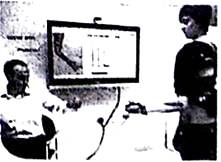B
Amanda Kitts is one of “tomorrow's people” people who have artificial (人工的) body pats. She has a bionic(电子操控的)arm.
Now, Kitts runs a day-care center. Children run up to her happily as she comes into the classroom. She bends over to talk with a small girl. As she bends Kitts puts her hands on her knees. For most people, this would be easy. However, just a few years ago, this was impossible for Kitts.

In 2006, Kitts was in a car accident. A truck crushed(挤坏) her left arm and the doctor had to cut it off. "I was angry, sad, depressed. I just couldn't accept it," she says. But then she heard about a new technique that could use the remaining nerves(神经) in her shoulder to contort an artificial arm.
In a difficult operation, a doctor moved Kitts's nerves to different areas of her upper- arm muscles. For months, the nerves grew. Millimeter by millimeter, they moved deeper into their new homes. “At three months I started feeling littletingles and twitches(刺痛和抽搐),”she said. A month later, she got her first bionic arm. A research engineer worked with Kitts to make the computer programs match her real movements more and more closely.
Today, Kitts's arm is great, but it's not yet perfect. She wants feeling in her hands. For example, she needs to feel whether something is rough or smooth. She also needs feeling to do one of her favorite things-drink coffee "The problem with a paper coffee cup is that my hand will close until it gets a solid grip,” she says. One time at a coffee shop, her hand kept closing until it crushed the cup. But Kitts says positively, "One day I'll be able to feel things with it, and clap my hands… to the songs my kids are singing”
